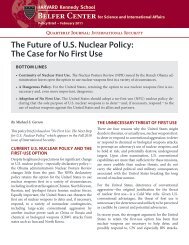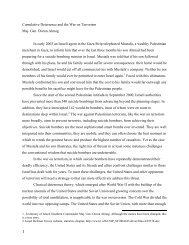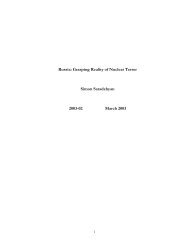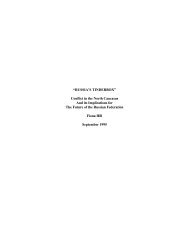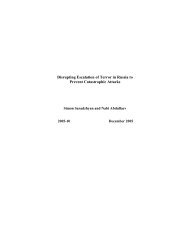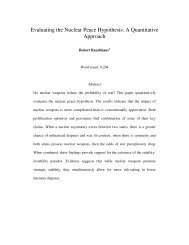The Heart of the Matter Valerie M. Hudson, - MIT Press Journals
The Heart of the Matter Valerie M. Hudson, - MIT Press Journals
The Heart of the Matter Valerie M. Hudson, - MIT Press Journals
Create successful ePaper yourself
Turn your PDF publications into a flip-book with our unique Google optimized e-Paper software.
<strong>The</strong> <strong>Heart</strong> <strong>of</strong> <strong>the</strong> <strong>Matter</strong> 9<br />
been, in <strong>the</strong> ªrst place, that <strong>of</strong> females. When thinking <strong>of</strong> war and peace and<br />
national security, many picture a uniformed soldier—male—lying dead on <strong>the</strong><br />
ªeld <strong>of</strong> battle, gendering <strong>the</strong>se important issues male. Perhaps fresh vision,<br />
such as <strong>of</strong>fered in ªgure 1, would turn thoughts to <strong>the</strong> girl baby drowned in a<br />
nearby stream or <strong>the</strong> charred body <strong>of</strong> a young bride burned in a “kitchen ªre”<br />
<strong>of</strong> her in-laws’ making. To pose <strong>the</strong> question more conceptually, might <strong>the</strong>re<br />
be more to inquire about than simply <strong>the</strong> effect <strong>of</strong> war on women—might <strong>the</strong><br />
security <strong>of</strong> women in fact inºuence <strong>the</strong> security <strong>of</strong> states?<br />
<strong>The</strong>oretically, <strong>the</strong>re are strong reasons for believing that <strong>the</strong>re is a relationship<br />
between <strong>the</strong> security <strong>of</strong> women and <strong>the</strong> security <strong>of</strong> states. Gender serves<br />
as a critical model for <strong>the</strong> societal treatment <strong>of</strong> difference between and among<br />
individuals and collectives. A long tradition in social psychology has found<br />
three basic differences that individuals notice immediately when <strong>the</strong>y encounter<br />
a new person almost from infancy: age, gender, and race. 5 Although <strong>the</strong>re is<br />
some preliminary evidence that recognition <strong>of</strong> racial differences can be<br />
“erased” when such differences are crossed with coalitional status, no one has<br />
shown a similar disabling <strong>of</strong> gender recognition. 6 Indeed, <strong>the</strong> psychologist<br />
Alice Eagley asserts, “Gender stereotypes trump race stereotypes in every social<br />
science test.” 7 In this way, gender, like age, becomes a basic category <strong>of</strong><br />
identiªcation and a pr<strong>of</strong>ound marker <strong>of</strong> difference. 8<br />
Gender and age categorizations play variant roles in society. Everyone will<br />
someday move into ano<strong>the</strong>r age group; in general, however, this cannot be<br />
said <strong>of</strong> gender groupings. Gender difference is arguably <strong>the</strong> primary formative<br />
ªxed difference experienced in human society, 9 and sexual reproduction is <strong>the</strong><br />
5. Marilyn Brewer and L. Lui, “Primacy <strong>of</strong> Age and Sex in <strong>the</strong> Structure <strong>of</strong> Person Categories,” Social<br />
Cognition, Vol. 7, No. 3 (1989), pp. 262–274; Susan T. Fiske and Steven L. Neuberg, “A Continuum<br />
<strong>of</strong> Impression Formation, from Category-Based to Individuating Processes: Inºuence <strong>of</strong><br />
Information and Motivation on Attention and Interpretation,” in Mark P. Zanna, ed., Advances in<br />
Experimental Social Psychology, Vol. 23 (Oxford: Academic <strong>Press</strong>, 1990), pp. 1–74; and Steven<br />
Messick and Diane Mackie, “Intergroup Relations,” Annual Review <strong>of</strong> Psychology, Vol. 40 (1989),<br />
pp. 45–81.<br />
6. Robert Kurzban, John Tooby, and Leda Cosmides, “Can Race Be Erased? Coalitional Computation<br />
and Social Categorization,” Proceedings <strong>of</strong> <strong>the</strong> National Academy <strong>of</strong> Sciences, Vol. 98, No. 26 (December<br />
18, 2001), pp. 15387–15392.<br />
7. Quoted in Andrew Stephen, “Hating Hillary,” New Statesman, May 22, 2008, http://www<br />
.newstatesman.com/north-america/2008/05/obama-clinton-vote-usa-media.<br />
8. Jacques Derrida, Of Grammatology (Baltimore, Md.: Johns Hopkins University <strong>Press</strong>, 1976); and<br />
Jacques Derrida, Writing and Difference (London: Routledge, 1978).<br />
9. We recognize that persons in nearly every society, modern and historical, have found ways to<br />
modify <strong>the</strong>ir assigned gender. This involves a very small minority <strong>of</strong> persons, however, with gender<br />
assignment being o<strong>the</strong>rwise immutable for <strong>the</strong> overwhelming majority <strong>of</strong> society. See<br />
Ramaswami Mahalingam, Jana Haritatos, and Benita Jackson, “Essentialism and <strong>the</strong> Cultural Psychology<br />
<strong>of</strong> Gender in Extreme Son Preference Communities in India,” American Journal <strong>of</strong><br />
Orthopsychiatry, Vol. 77, No. 4 (October 2007), pp. 598–609.





